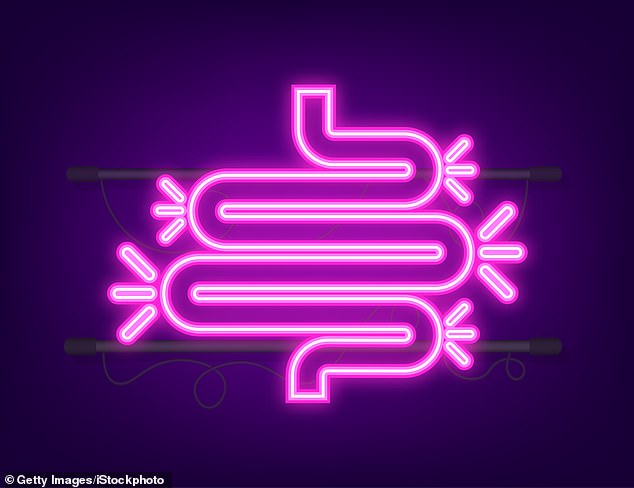From nausea pills to hypnosis, the latest ways to beat the misery of IBS
It is one of the most common reasons for a visit to the GP and affects millions of Brits. But people with irritable bowel syndrome (IBS) often struggle to find effective treatment for the pain, cramps, bloating and urgency, leaving many homebound and in pain or having to plan their daily lives like a military operation .
Now a study published in The Lancet has shown that a cheap antidepressant (25 cents a day) can relieve symptoms for some. The British study found that those who took a low-dose amitriptyline pill – 10 mg to 30 mg – were almost twice as likely as the placebo group to report an improvement.
IBS affects the wiring system between the brain and the intestines, which controls how food moves through it.
There are different types of IBS. The most common is IBS-D, characterized by diarrhea and abdominal pain; IBS-C, where constipation and abdominal pain are the main problems; IBS-mixed, in which the patient alternates between loose stools and constipation with abdominal pain; and IBS-U, where symptoms vary.
So how can an antidepressant help? It comes down to its effect on serotonin receptors in the gut, explains Alexander Ford, professor of gastroenterology at the University of Leeds and co-principal investigator on the Lancet study.

IBS affects the wiring system between the brain and the intestines, which controls how food moves through it
Serotonin is a chemical that carries messages between cells in the brain and elsewhere in the body. Ninety percent of the body’s serotonin is located in the intestines, where it affects motility.
By acting on the serotonin receptors, amitriptyline changes the way messages are sent and received, altering intestinal activity.
‘It also acts on norepinephrine (another chemical messenger) receptors in the gut, which may be how it affects pain signaling,’ Professor Ford told Good Health.
The study found that amitriptyline significantly reduced stomach pain.
The use of amitriptyline for IBS is actually not new. ‘NICE guidelines already recommend GPs use low-dose amitriptyline,’ explains Professor Ford. ‘However, because the evidence was not very strong, this was not widely accepted by GPs, but was accepted by specialists in hospitals.
‘So most people with IBS have been given nutritional advice and told to take laxatives, anti-diarrhoea medicines and/or antispasmodics. However, most of these treatments have only a modest impact.
“We hope that it (amitriptyline) will now be used more widely,” he says, adding that there are other, little-known, approved second-line treatments, such as linaclotide, that can be used for IBS-C.
Here we explore other IBS treatments.
Anti-nausea pill
Ondansetron, currently used in patients experiencing nausea and vomiting after chemotherapy, radiotherapy and surgery, may be beneficial in IBS-D, where diarrhea is the main symptom.
The drug is known as a 5HT3 receptor antagonist and blocks the action of serotonin in the intestines. And like amitriptyline, it is cheap and widely available.

People with irritable bowel syndrome (IBS) often have difficulty finding effective treatment for the pain, cramps, bloating and urgency (file image)
A 2014 study by the Queen’s Medical Centre, Nottingham, published in the journal Gut, found that ondansetron reduced loose stools, frequency and urgency in patients with IBS-D.
Robin Spiller, professor of gastroenterology who led the trial, said he had been prescribing ondansetron off-label (for a condition other than the one for which it is registered) to IBS patients ‘for a number of years and knew it was effective in some could be’.
“I had studied patients who developed IBS after Campylobacter gastroenteritis (a stomach flu caused by the Campylobacter bacteria) and found that they had an excess of serotonin-containing enteroendocrine cells (intestinal cells that produce serotonin),” he says.
These cells also released more serotonin than normal after the patients ate.
He realized that because serotonin stimulates intestinal motility, a drug that blocks its action could improve diarrhea.
“For those who respond, odansetron could be life-changing,” says Professor Spiller, who, along with Professor Ford, hopes to secure funding for a trial along the lines of the amitriptyline study.
Custom-made bacteria
For more than twenty years, researchers have been investigating how probiotics (good bacteria) and prebiotics (foods that nourish probiotics) can help with IBS.
The theory is that some IBS symptoms are due to an imbalance in the microbiome – the billions of microbes in the gut.
Glenn Gibson, professor of food microbiology at the University of Reading (who coined the term “prebiotics”), says both stimulate more beneficial microbes, “which helps reduce symptoms such as gas,” i.e. bloating.
The bacteria’s byproducts (‘metabolites’) can also affect brain function, which may be useful in IBS because anxiety or stress often leads to attacks. For example, Lactobacillaceae bacteria make GABA (Gamma-Aminobutyric Acid), a chemical messenger that has a calming effect on the brain.
The metabolites are transported to the brain via the bloodstream or communicate with it via the vagus nerve (which runs from the brain to the intestine).
At King’s College London, researchers Dr Saeed Shoaie and Dr David Moyes have explored the idea that people with IBS could be offered a more personalized approach to improving the composition of their gut bacteria. In a 2022 paper published in the Journal of Translational Medicine, they wrote that artificial intelligence could be used to design customized treatments tailored to the individual’s microbiome.
This would require a database containing the microbiome data of tens of thousands of people, showing how different gut bacteria respond to different foods, supplements, lifestyles and their age and weight.
An algorithm would then predict how an individual’s microbiome would behave and how it should be treated. So an IBS patient could go to the doctor, provide a stool sample and have personal information recorded, such as their weight, and then the sample would be tested and analyzed in a laboratory to see what strains of bacteria it contained.
Based on this and the patient’s other data, the computer would make a prediction, explains Dr David Moyes, senior lecturer in host-microbiome interactions.
“It would say, OK, you’re low on this, so you need to increase these foods.” Or it might provide a tailor-made probiotic cocktail.’
Talking therapies
Talking therapies such as cognitive behavioral therapy (CBT) may work as well as medication to reduce IBS symptoms, according to a study published in 2019 in the journal Gut. In the study, 558 patients received a form of CBT tailored to IBS, or received ‘treatment as usual’, i.e. their usual IBS treatment from their doctor.
After 12 months, the CBT patients experienced an improvement comparable to the amitriptyline study, says Rona Moss-Morris, professor of psychology as applied to medicine at King’s College London and the NIHR Maudsley Biomedical Research Centre, who led the study.
What the cognitive behavioral therapy did, what the amitriptyline didn’t do, “was reduce the depression and the anxiety, as well as the extent to which IBS was affecting people’s lives,” she says. ‘Sometimes people think that if you offer CBT it’s not a physical health complaint, but that’s not what we’re saying.
‘It focuses on how specific thought patterns, behaviors and emotions can perpetuate some symptoms of IBS.’
For example, many people with IBS develop ‘safety and avoidance behaviour’: they may stop going outside or spend time worrying about where the toilets are. ‘This can trigger a cycle of worry – and we know that stress escalates IBS,’ explains Professor Moss-Morris.
‘People often change their diet too, so they try this, they try that, which affects their routine – and actually our bodies tend to like routine.
‘So while there are dietary changes that can help, this chopping and changing isn’t particularly helpful. We can tackle this behavior in CBT.’
Emerging evidence also shows that our emotions can change our microbiome, she says. This too can be addressed by CGT, as shown in a small 2022 study from the University at Buffalo in the US. Stool samples from severe IBS patients before and after CBT showed that the microbiome was altered.
“It’s quite remarkable,” said Dr. Jeffrey Lackner, chief of the Department of Behavioral Medicine, who conducted the study.
Professor Moss-Morris says it is not a matter of choosing between medication or cognitive behavioral therapy.
“CBT can easily be done alongside medication,” she says. ‘We normally recommend trying medications first, as medications like amitriptyline are relatively cheap and quite easy to take.’
Professor Moss-Morris hopes that a web version of CBT will soon be available on the NHS.

